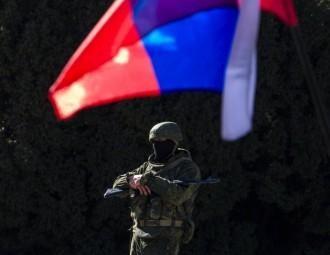Uladzimir Matskevich: Russia is looking for some reason to justify its aggression behindhand

Though Putin has no ambitions about Constantinople, the return former Soviet states to the Russian empire are in his plans.
Uladzimir Matskevich, the head of the Board of the International Consortium “EuroBelarus”, is convinced that Russian regime wants to return “post-Soviet countries” to the new Russian empire. He told that in the interview with the EuroBelarus Information Service.
- On the first day of independence the blood of Ukrainian soldiers was shed in Simferopol: one is killed, two are seriously injured and the rest are arrested. Crimea’s “self-defense” stormed Ukrainian naval headquarters; in return Kiev permitted Ukrainian soldiers to use weapon in Crimea. Is it a war?
- It is hard to name it a full-scale war; it is rather a continuing tension and an attempt to provoke Ukrainian army to start open confrontation. Ukrainian army is struggling to the bitter end…
- Does Russia want to fight?
- Kremlin is looking for some reason that would justify his aggression in Crimea: why was it required to introduce Russian army to the Crimean peninsula? Soon the military rage is over and then time for questions will come. Before “aliens”, i.e. Russian armed unmarked groups came nobody in Crimea had never heard about separatists and “Right sector”; there were no violence based on ethnicity, and no problems with the Russian language. Crimea was a calm periphery of bustling Ukraine.
- Putin has recognized the independence of Crime and annexed it. Kazakhstan “under the current circumstances treats this decision with understanding”, while Lukashenka and Putin “exchanged their opinions regarding Ukraine and the situation with the referendum in Crimea”. If even closest Kremlin’s allies did not support Russian aggression, we can only guess about the future of the “independent Crimea”.
- We have similar case in history, when Russia acted the same way with Abkhazia and South Ossetia. After the six years of “liberation” we see what has become of these states: destruction, anarchy, forceful retention of power by criminal gangs, who are unable to organize normal life. Transnistria can serve as an example, too.
So we can predict that the same fate is awaiting Crimea.
- Putin’s speech yesterday was confusing: some of his words suggest that he will “defend” the Russian-speaking population of Crimea in the future, some other words, though, demonstrate that he is not going to step further into Ukraine. What we are to expect from Putin?
- Putin started lying long before the Ukrainian events. A week before the invasion to the Crimean territory Putin was publicly swearing that he won’t lead Russian army to Ukraine. We shouldn’t believe his words; we should only take them as a situational propaganda.
- But you called Putin’s yesterday statement a long-term program of Kremlin regime. Will you explain that?
- Recent Putin electioneering was focused on expansion and taking revenge. It was military-like, even if worded diplomatically. Putin promised to dedicate his next presidential term to the restoration of historical justice as he sees it: to compensate for the loss of the Russian native territories. Thus, he formulated his mission earlier, and now he only proves his mission with actions.
Kremlin’s long-term intentions are focused on expansion of imperial borders. Though Putin has no ambitions about Constantinople, he plans to return former Soviet states to the Russian empire.
-
03.01
-
07.10
-
22.09
-
17.08
-
12.08
-
30.09








































